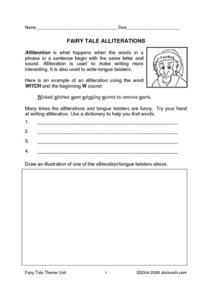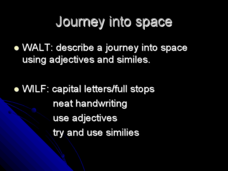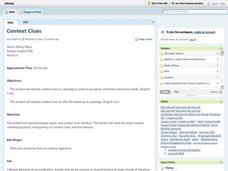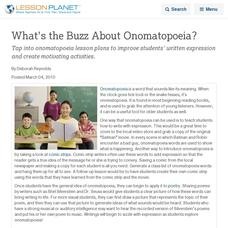Curated OER
Like Water for Chocolate Guided Reading Worksheet
Planning a novel unit on Like Water for Chocolate by Laura Esquivel? If so, this comprehensive guided reading worksheet might appeal to you. Steer readers through the entire novel with a routine of comprehension questions and analysis...
Curated OER
Logs, Charts, and Journals: What's On Your Plate?
Have your writers identify and use words that appeal to the senses. They create a chart of sensory words and record some of their favorites, then write a journal entry in which they describe eating at a restaurant using sensory details....
Curated OER
Citizenship
Students investigate patterns of immigration in the US while comparing and contrasting the ideas of citizenship and non-citizenship. They decide how education plays a role in citizenship.
Curated OER
Narratives
Add to the narrative writing experience. Elementary or middle school writers listen to the teacher read a descriptive passage, then reread the same passage silently. They highlight sensory details and figurative language, then orally...
Curated OER
Reading Examples
Young writers read excerpts from Gary Paulsen's memoir to identify figurative and literal language that contain sensory details. They determine which selections are examples of sensory language and fi the language is used literally or...
Curated OER
Writing a Character Description
Invoke creativity by using this resource on writing techniques. Learners create a description of a character they could use in their writing, focusing on the proper use of adjectives, similes, and metaphors. It's a great presentation for...
Curated OER
Metaphor
High schoolers identify the distinction between literal and figurative language with a focus on metaphors. They complete a metaphor analysis chart, then practice expanding metaphors by composing their own comparisons of elements of the...
Curated OER
Using Similes and Metaphors in Poetry
The use of similes and metaphors will become more clear and your students will gain knowledge and comprehend the meanings of the words with these activities. They compose interesting similes and metaphors based on visual prompts and...
Curated OER
Making Inferences While Identifying Similes and Metaphors
Use this lesson to study similes and metaphors and the inferred meaning. In this language arts lesson, 5th graders write their own similes and metaphors. A worksheet is provided for extension work or to check understanding as homework.
Curated OER
Similes and Metaphors
Pupils examine poetry to identify the use of metaphors and similes after the teacher defines what they are. They decide how they can use similes and metaphors to describe different pieces of fruit. Finally, they write poetry about the...
Curated OER
Fairy Tale Alliterations
Fairy tales are the perfect way to focus on alliteration. Learners complete activities relating to alliteration and similes using a fairy tale theme. Then, they complete an acrostic poem using the words fairy tale.
Curated OER
Learning Intentions
What a helpful resource! This presentation could be used to review literary terms in the classroom. Learners view a series of slides defining the meaning of terms, such as personification, imagery, similes, metaphors, and alliteration....
Curated OER
Personification
The meaning of personification is the focus of this language arts presentation. Upper elementary writers are exposed to the concept of personification, then practice implementing the technique by adding color to the sentence, "Leaves are...
Curated OER
My Monster
Explore descriptive language. Learners read a series of similes describing the eyes, teeth, skin, and other features of a monster. Then, they describe their own imaginary monster using similes and adjectives. Very creative!
Curated OER
Journey Into Space
Embark on a journey through space with your class. Learners explore the solar system using adjectives and descriptive language. This is a great way to cement knowledge about the solar system, while reinforcing writing skills. Your class...
Curated OER
Context Clues
Work on context clues with your ninth graders in this lesson, which focuses on identifying and analyzing clues to define unfamiliar words. They identify context clues in a passage to recognize words they haven't seen before, and then...
Curated OER
Sense Poetry
Access your young poets' senses and emotions with this activity, which guides them through the process of writing a "sense poem." After working on a sense poem as a class and modeling the procedure, individuals work on their own poems...
Curated OER
Similes and Metaphors: An Interactive Review
Get your pupils' attention with this lesson on similes and metaphors, which features two poems by Tupac Shakur. A SMART board presentation guides them through the lesson, which includes a BrainPop activity (linked). After they have...
Curated OER
Literary Terms: Allegory
Confused why a book about a third grade class is referring to outer space? The paragraph you're reading might be an allegory. The slide in this PowerPoint gives a detailed definition, as well as an example of an allegory. Tip: Assign...
Curated OER
Awesome Animals
Sixth graders write descriptive narratives about animals. In this descriptive writing lesson, the teacher models how to write a paragraph with interesting sensory words and exciting verbs. Students choose a picture of an animal they want...
Curated OER
What's the Buzz About Onomatopoeia?
Tap into onomatopoeia lesson plans to improve students' written expression and create motivating activities.
Curated OER
Lift Every Voice and Sing
Students analyze sculpture, poetry, and music to gain an understanding of historical events. In this critical thinking skills lesson, students take a closer look at African-American history as they examine "Lift Every Voice and Sing'"...
Curated OER
Chalkboard Challenge: Literary Terms
This interactive PowerPoint simulates a "Jeopardy" game that addresses figurative language, cause and effect, and other literary terms. Players can chose which category and amount they would like to play on the Game Board.
Curated OER
Haiku Wrap Up
Students create a haiku about the land formations they've studied. In this haiku lesson, students identify the metaphor and meaning of a given haiku, brainstorm comparisons for a landform photo as a class and choose one to use in a...

























